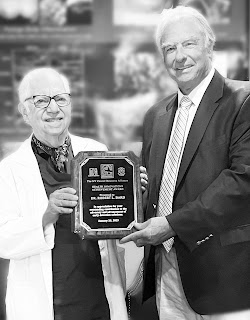NATIONAL CANCER ADVOCACY GROUP RECOGNIZES BARD DIAGNOSTIC RESEARCH FOR ADVANCEMENTS IN DENSE BREAST IMAGING
 8/28/2023- Joseph Cappello, Sr. National Advisor for breast cancer initiatives with the Integrative Cancer Resource Alliance, presented the 2023 ICRA Cancer Research & Innovations award to cancer imaging specialist Dr. Robert Bard.
8/28/2023- Joseph Cappello, Sr. National Advisor for breast cancer initiatives with the Integrative Cancer Resource Alliance, presented the 2023 ICRA Cancer Research & Innovations award to cancer imaging specialist Dr. Robert Bard.
With over 200 nominations for the award, Dr. Bard was recognized for his lifetime of achievements in support of non-invasive screening of dense breast tissue. Mr.Cappello delivered the award with fellow executives Donna Johnson (Pres. Of Are You Dense Foundation) and Marion Bradley (Pres. Of Are You Dense Advocacy Foundation from Woodbury CT to personally honor Dr. Bard at his midtown NYC practice for his life's work. Since 2019, Mr. Cappello's Are You Dense Advocacy Foundation succeeded in helping to pass National legislation to federally mandate breast screening centers to address the dense breast crisis with the ultrasound complement. Mr Cappello's commitment to enforce this legislation nationally, started with his wife, the late Dr. Nancy M. Cappello who passed away due to complications with her late stage breast cancer treatment.
Since 1979, Dr. Bard's radiology practice clinically promoted and published the critical need for using ultrasound breast imaging as a supplemental scan alongside regularly scheduled mammograms. (It is noted that ultrasound scans are able to detect growths and tumors behind dense tissue, what mammograms tend to miss). At the time, no regulatory standard enforced the need for this 2nd scan, attributing to many undetected breast cancer tumors concealed by dense breast tissue. With the rise of breast cancer cases throughout the country, Dr. Bard's theories about dense breast imaging has taken root with a growing population of OB-GYNs and Imaging specialists.
On a related note, in January of 2023- ARE YOU DENSE ADVOCACY continued to pursue the public importance of patients receiving their own personal medical information about the condition of their breast health. This initiative directs the Food and Drug Administration to ensure that mammography reports and summaries received by patients and their providers include appropriate information about breast density specified by the law. This also includes at a minimum, the effect of breast density in masking the presence of breast cancer on a mammogram. The qualitative assessment of the provider who interpreted the mammogram, and a reminder to patients that individuals with dense breast tissue should talk with their providers if they have any questions or concerns about their summary. From a prior report (3/28/2019) the Department of Health and Human Services and the FDA announced changes to the MQSA (Mammography Quality Standards Act) to include reporting of dense breast tissue to the patient- by and large, thanks to the Are You Dense Advocacy Foundation."Decades since the advent of breast scanning technology, a growing list of real-time innovations in non-invasive diagnostic imaging provide new options in the field of early detection", states Dr. Bard. "These technologies directly align with breast density screening that can easily and affordably complement a woman's regular mammography appointment. By hybridizing the imaging process, we can safely combine diagnostic modalities and improve the assessment of disease and guide therapeutic procedures."
According to a 12/13/2022 press release, Congresswoman Rosa DeLauro (CT-03), Congressman Brian Fitzpatrick (PA-01), and award-winning journalist Katie Couric introduced their legislation, the Find It Early Act. This bill would ensure all health insurance plans cover screening and diagnostic mammograms and breast ultrasounds and MRIs with no cost-sharing. “It means a great deal to me to join Katie Couric, Congressman Fitzpatrick, and all of the breast cancer advocates here to talk about what we must do to detect breast cancer early and save women’s lives,” said Congresswoman Rosa DeLauro. (See complete feature)"Dr. Bard will go down in medical history as one of the earliest change-makers in our crusade to improve women's early detection programs. His innovative approach to combine technologies makes him a true visionary for the next generation of cancer professionals... by standing his ground about the crisis and aiding in (what is now) a national legislation to save more lives!", states Mr. Cappello.
Video News Release: Innovations in Early Detection "Are You Dense?" Foundation Co-founder Joe Cappello joins the medical diagnostic community to promote the "Get Checked Now!" campaign. Dr. Robert Bard from the Bard Cancer Center (NYC) supports supplemental imaging including the 3D Doppler Ultrasound scanner to offer dense breast detection. This video presents some of the latest advancements in ultrasound features to detect tumors through dense breast tissue- reportedly a significant challenge with mammograms. |
In 2014, Imaging Technology News (ITN) introduced breast cancer survivor-turned-crusader Dr. Nancy Cappello and her story about having dense breast tissue leading to a late-stage cancer. A false negative mammography scan (diagnosed in 2004) concealed a large 2.5 cm suspicious lesion, which was later confirmed to be stage 3c breast cancer. This same cancer had metastasized to 13 lymph nodes. This sparked Dr. Cappello to create the "Are You Dense?" Foundation- an international awareness crusade to better support dense breast diagnostics and initiatives pass legislation to enact laws requiring mammography centers to inform patients about their breast density and the associated cancer risks. Dr. Cappello passed away on Nov 15, 2018, from secondary myelodysplastic syndrome (MDS), a bone marrow cancer that was a complication of her prior aggressive breast cancer treatments. But she ignited a legacy of fighting for improved policies, imaging technologies and advanced research to better address this health crisis that puts the est. 40% of the female population (women with dense breasts) at risk of a false negative reading.
# # #





No comments:
Post a Comment